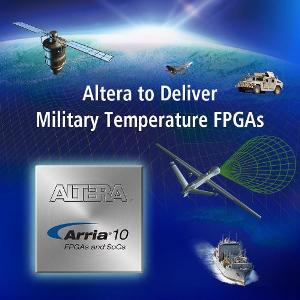Aug 28 2014
Altera Corporation today announced military temperature (Mil Temp) qualification plans for its newest 20 nm Arria® 10 FPGAs and SoCs, which will be qualified for extreme temperature environments (-55C to 125C ambient). In addition to the ratings, Altera can provide guidelines on speed grades, protocols, and external memory interfaces best suited to specific applications.
All devices will be characterized, qualified and tested by Altera, providing reduced and reliable lead times. Customers can receive notifications, access ratings, and the Military Temperature brochure by setting up an account through the myAltera Military Portal.
 Altera to deliver 20 nm FPGAs and SoC devices at military temperature. (PRNewsFoto/Altera Corporation)
Altera to deliver 20 nm FPGAs and SoC devices at military temperature. (PRNewsFoto/Altera Corporation)
"Altera is committed to supporting military customers by ensuring Mil Temp variants of our next-generation products are available," said David Gamba, senior director of the Military, Aerospace and Government Business Unit at Altera. "Though not all defense applications operate in the extremes of the Mil Temp range, early notification of these qualification plans allows customers to make valuable platform design decisions now that allow for cost-effective variants and easier design migration later."
Arria 10 Features Hard Floating Point DSP Blocks
Altera's Arria 10 FPGA and SoC devices are the only FPGAs in the industry to feature integrated, hardened IEEE 754-compliant, floating-point operators, which deliver the industry's highest GFLOPS per Watt performance compared to other hard floating point solutions on the market. The hard floating point DSP blocks featured in Arria 10 devices facilitate native floating point support, thereby reducing development time by 6 to 12 months. These macros are useful for many military and aerospace applications, from real-time tactical uses to wide-view satellite survey platforms. They also enable precise designs in ground-based and airborne phased-array radar and directional antenna applications.
Arria 10 SoCs are also the industry's only 20 nm devices with integrated ARM processors.
Altera Offers a Broad Range of Programmable Logic Solutions
Altera programmable logic technologies enable systems designers to use FPGAs, SoCs, IP, and design tools for applications in the industrial, surveillance, automotive, military, broadcasting and consumer sectors. Altera FPGAs and SoCs provide a parallel architecture aids in the acceleration of processing algorithms, while the Altera SDK for OpenCL design tool offers easy implementations of parallel processing applications onto FPGAs.
To learn more about Altera Stratix and Arria 10 military temperature devices visit http://www.altera.com/devices/common/military/mil-temp.html.